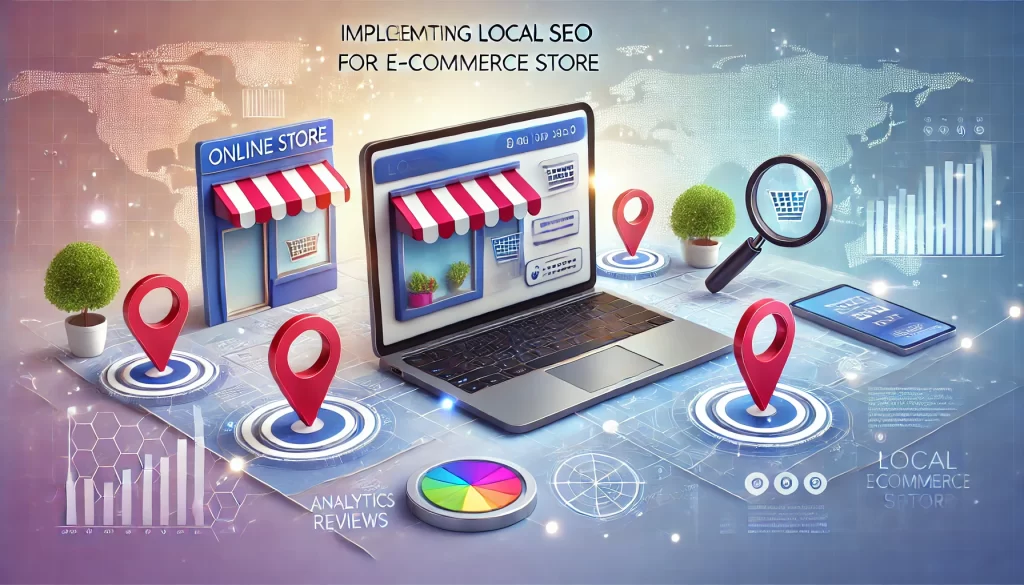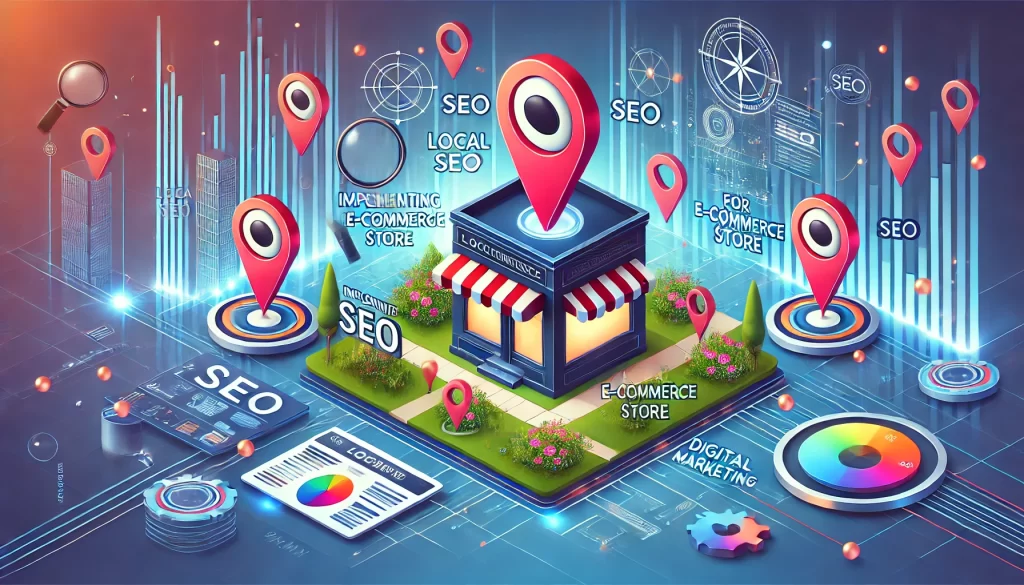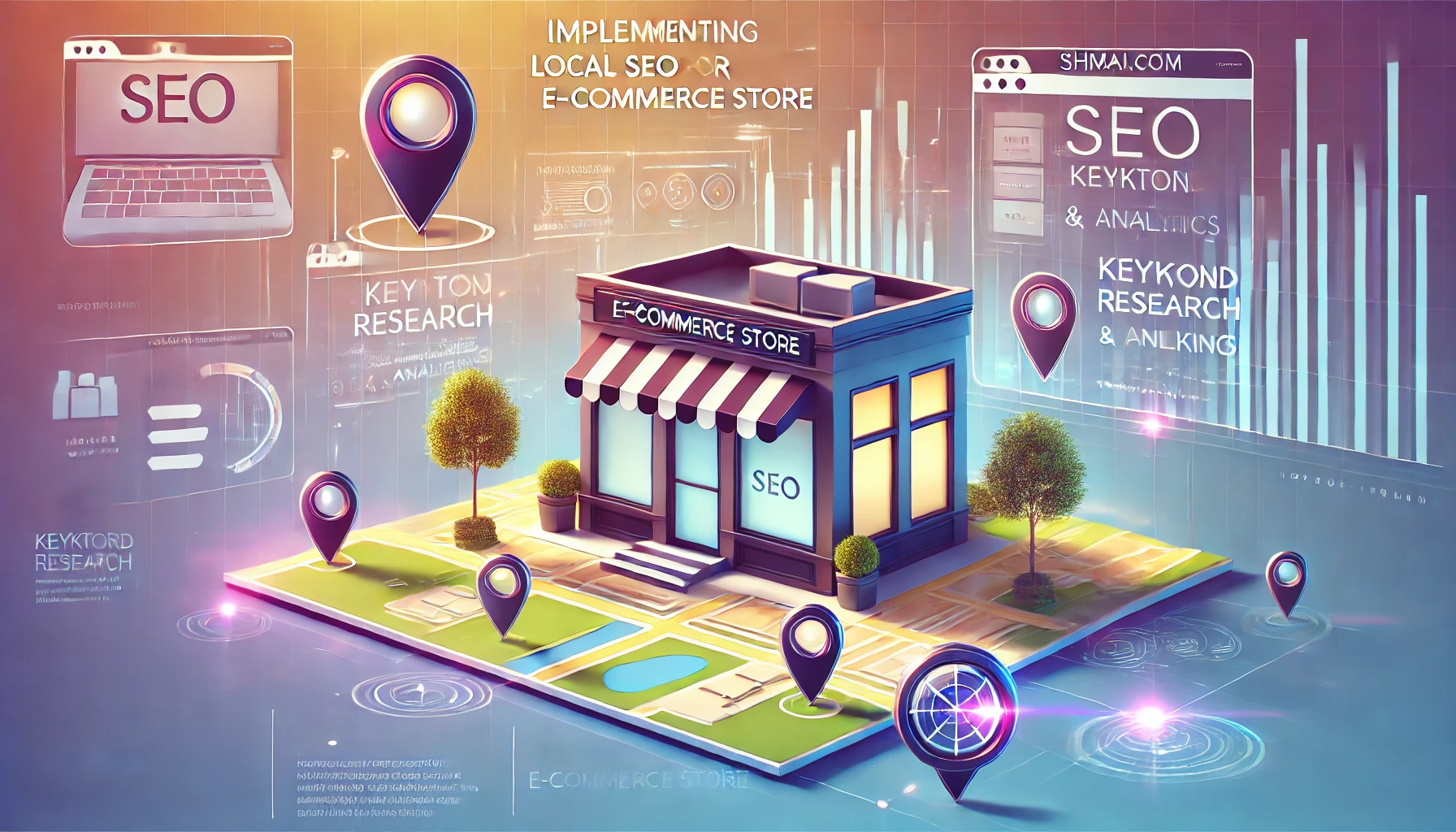Local SEO focuses on optimizing your website and online presence to rank higher in local search results. For an e-commerce store, local SEO can help you attract more customers from your area and build a stronger connection with local communities. Whether you’re a brick-and-click business with a physical location or an online-only store with a local target market, local SEO strategies can help you capture customers nearby.
Here are some ways Local SEO can benefit your e-commerce store:
- Increased Visibility: Appear in local search results, Google Maps, and the Local Pack.
- Targeted Traffic: Reach customers who are actively searching for your products near their location.
- Higher Conversion Rates: Local customers are more likely to convert, especially when you provide localized content or promotions.

Key Local SEO Strategies for E-commerce Websites
Implementing the right local SEO strategies will help your e-commerce business rank well in local searches. Let’s look at the best practices:
Claim and Optimize Your Google My Business Listing
Google My Business (GMB) is a free tool that allows businesses to manage their online presence across Google, including search and Google Maps. For e-commerce stores, especially those with physical locations or local service areas, having a fully optimized GMB profile is essential.
Steps to optimize your GMB listing:
- Complete your profile with up-to-date contact information, hours of operation, and a description of your services.
- Add photos of your products, store, or services to make your listing visually appealing.
- Encourage customer reviews and respond to them, as reviews boost local rankings and build trust.
Optimize for Local Keywords
Keyword research is foundational for any SEO strategy, and for local SEO, it’s no different. For e-commerce stores, make sure to target local keywords that reflect the geographic areas where your customers are located.
Suggested Posts:
• Technical SEO vs On-Page SEO
• SEO Packages Pricing Models
• SEO Pricing Guide
Example local keyword strategies for e-commerce:
- Use keywords like “buy [product] in [city]” or “best [product] store near me.”
- Incorporate local phrases, landmarks, and neighborhoods into your product descriptions, titles, and metadata.
- Include location-based terms in your URLs and image alt text.
Create Location-Specific Landing Pages
If your e-commerce business serves multiple areas or cities, creating location-specific landing pages can help you rank in those local searches. These pages should be designed with relevant information about each location, including products, services, and local promotions.
Each location page should include:
- Local keywords tailored to the area.
- A clear description of your products and services available in that location.
- Contact details and relevant store information, if applicable.
Build Local Citations
Local citations refer to any online mention of your business’s name, address, and phone number (NAP). Consistent and accurate citations across local directories (e.g., Yelp, Yellow Pages, Chamber of Commerce) improve your chances of ranking well in local search results.
Tips for building local citations:
- Ensure your NAP information is consistent across all platforms.
- Claim your business listings on popular directories and update them regularly.
- Submit your site to local industry-specific directories.
Create Localized Content and Blog Posts
To show Google and users that your e-commerce site is relevant to local customers, create location-based content. This content can be blog posts, city guides, or how-to articles about using your products in specific regions. For example, if you sell gardening supplies, create content like “Top Gardening Tips for Los Angeles Homeowners.”
Suggested Posts:
• Best SEO Audit Service
• Website SEO Audit Guide
• Fix SEO Issues with Audit
Content ideas to help you rank locally:
- Local events or seasonal trends.
- Local customer testimonials or case studies.
- Local product features or promotions.
Optimize for Mobile Search
With the growing number of consumers shopping on mobile devices, mobile optimization is crucial for local SEO. Mobile users are often on the go and looking for local businesses. Make sure your site is mobile-friendly, as Google prioritizes mobile-first indexing for ranking.
Mobile optimization tips for e-commerce sites:
- Ensure your website is responsive, so it adapts to any device.
- Optimize page load speed, as mobile users expect fast-loading sites.
- Use clear call-to-action (CTA) buttons and easy navigation on mobile screens.

Leverage Local Reviews and User-Generated Content
Reviews are one of the most influential ranking factors for local SEO. Positive reviews can improve your visibility and credibility, encouraging more local customers to trust your business.
How to leverage reviews for local SEO:
- Request reviews from local customers after they make a purchase.
- Respond to reviews, thanking customers for their feedback.
- Use user-generated content (e.g., photos, videos) on your product pages or social media.
How Local SEO Improves E-commerce Store Performance
By following local SEO best practices, you can expect an improvement in key metrics such as:
- Local traffic: More people from your target area will visit your site.
- Conversion rate: Local customers are more likely to purchase since they are closer to your physical or service location.
- Brand awareness: As you appear in more local search results, your e-commerce store becomes more familiar to nearby consumers.
FAQs About Local SEO for E-commerce
What is the difference between local SEO and regular SEO?
Local SEO is focused on improving visibility for geographically relevant searches, whereas regular SEO is more focused on general search engine ranking without any location-based targeting.
Can local SEO help my online store if I don’t have a physical location?
Yes, if your business serves a specific region or customer base, local SEO can help you attract customers in that area. For example, if you offer local delivery, make sure to optimize for your service area.
How long does it take to see results from local SEO?
It typically takes 3-6 months to see significant results from local SEO efforts, as ranking improvements and customer reviews build over time.
Should I create a separate page for each location my e-commerce store serves?
Yes, if you cater to different cities or areas, create specific landing pages optimized for those locations. This can help you rank for location-specific keywords.
Conclusion
Unlock Your E-commerce Store’s Local Potential
Implementing local SEO strategies for your e-commerce site is crucial for growing your customer base and improving your rankings in local search results. By focusing on tactics like Google My Business optimization, local keyword targeting, and building local citations, you can increase visibility, drive traffic, and convert local customers into loyal buyers.
Start by applying the strategies above and watch your e-commerce store become a local search powerhouse!
